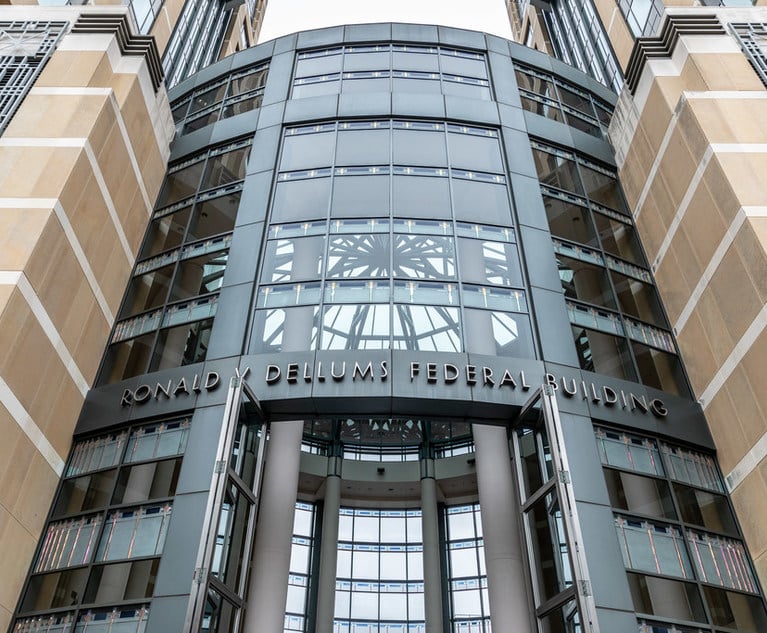Chrysler Wins Fight to Keep Court Records Involving Allegedly Faulty Part Sealed
A Ninth Circuit panel concluded that U.S. District Judge Dean Pregerson used the right standard to keep documents sealed in a case claiming faulty power modules caused some Chrysler and Jeep vehicles to stall or have trouble starting.
August 27, 2018 at 06:08 PM
5 minute read
 Rows of Jeep Grand Cherokees are lined up outside the Jefferson North Assembly Plant in Detroit. Photo Credit: The Associated Press
Rows of Jeep Grand Cherokees are lined up outside the Jefferson North Assembly Plant in Detroit. Photo Credit: The Associated Press
Chrysler Group has won a key ruling in its bid to keep documents sealed in a closely watched case over an alleged defect in millions of its vehicles.
The U.S. Court of Appeals for the Ninth Circuit affirmed a federal judge's ruling that sealed documents in a case alleging Chrysler vehicles had a defective power module. The Aug. 23 decision comes after Chrysler failed to convince the U.S. Supreme Court to take up its petition to reverse an earlier ruling in which the Ninth Circuit found the federal judge in the case had used an incorrect standard to seal the records.
The Center for Auto Safety, a consumer group in Washington, D.C., that won that 2016 ruling, argued in its latest appeal that the public's interest continued to justify unsealing documents. Chrysler insisted the records contained trade secrets and proprietary information that could end up in the hands of its competitors.
The panel concluded that, unlike the record in its earlier ruling, U.S. District Judge Dean Pregerson of the Central District of California used the right standard to keep documents sealed in the case.
“In this case, the district court performed a meticulous in camera examination of the 20 exhibits at issue; weighed relevant competing interests, without being speculative; and determined that compelling reasons justified Chrysler's maintaining a category of redacted documents under seal that contained sensitive trade secret and/or personal contact information,” wrote the panel in a memorandum decision. “After painstakingly applying a balancing test, premised on compelling reasons, the district court articulated its factual findings in a well-reasoned order.”
The panel members were Circuit Judges Richard Clifton and Consuelo Callahan, both President George W. Bush appointees, and President Ronald Reagan appointee U.S. District Judge Kenneth Hoyt of the Southern District of Texas, sitting by designation.
A spokesman for Chrysler, now called FCA US, which was represented by Steve D'Aunoy, a partner at Thompson Coburn in St. Louis, Missouri, declined to comment.
Leslie Bailey, a staff attorney at Public Justice who represented the Center for Auto Safety, said in a statement: “The Center for Auto Safety maintains its original position: Chrysler wanted these documents hidden from the public to avoid responsibility for significant quality and potential safety issues related to the [totally integrated power module]. While the center believes the court of appeals erred in affirming the district court's opinion, based on current safety priority projects we will not be appealing this decision.”
Filed in 2013 in the U.S. District Court for the Central District of California, the class action sought to represent consumers in six states who owned or leased various models, including Jeep Grand Cherokees and Dodge Durangos that Chrysler ended up recalling in 2014 and 2015. The case alleged a problem in the totally integrated power module, or TIPM, caused Chrysler vehicles to stall or have trouble starting. The Center for Auto Safety sought to intervene in the case, which later settled for a confidential sum.
The auto safety group, which had petitioned the U.S. National Highway Traffic Safety Administration to launch an investigation, sought to intervene for the sole purpose of gaining access to sealed records in the case—in particular, documents associated with the plaintiffs' motion for a preliminary injunction requiring Chrysler to warn the public about the defect.
At the trial court below, Pregerson denied the preliminary injunction motion and the center's request to intervene and unseal the records.
In 2016, the Ninth Circuit reversed, finding that Pregerson's reliance on a certain standard—whether Chrysler had “good cause” to seal the records—was not appropriate for a pleading that is “more than tangentially related to the merits of the case.” Such pleadings have a strong presumption of public interest, so Chrysler needed to have “compelling reasons” for the sealing.
Chrysler petitioned the U.S. Supreme Court, arguing that the Ninth Circuit had created a circuit split. Several business groups, including the U.S. Chamber of Commerce and the Washington Legal Foundation, had backed Chrysler's petition.
On remand, Pregerson sought supplemental briefing on both sides to address the “compelling reasons” standard. He ruled for Chrysler in 2017—but not without reservations. At a hearing, he said the “competitive advantage issue is a tough one,” because it wasn't just about technical elements. “I don't know where to draw the line.”
The Center for Auto Safety made note of those remarks in its appeal brief, which said Chrysler's “compelling reasons” were based on “hypothesis and conjecture.” Bailey wrote: “If the district court's decision is permitted to stand, the compelling reasons standard will be diluted, and the distinction between that standard and the lower good cause standard for discovery documents will be blurred.”
But Chrysler, in its appeal brief, said Pregerson did a “document-by-document and line-by-line review.”
“Here, the district court exercised its broad latitude properly, and found that there are compelling reasons to keep the documents at issue sealed, notwithstanding the public's right to access,” D'Aunoy wrote. “Here, the record is amply clear that the district court weighed the relevant competing interests and relied on no hypothesis or conjecture.”
This content has been archived. It is available through our partners, LexisNexis® and Bloomberg Law.
To view this content, please continue to their sites.
Not a Lexis Subscriber?
Subscribe Now
Not a Bloomberg Law Subscriber?
Subscribe Now
NOT FOR REPRINT
© 2025 ALM Global, LLC, All Rights Reserved. Request academic re-use from www.copyright.com. All other uses, submit a request to [email protected]. For more information visit Asset & Logo Licensing.
You Might Like
View All
Crypto Exchange’s ‘Meteoric Rise’ Leads to Nationwide Class Action Trend
4 minute read
Penn State Dickinson Law Dean Named President-Elect of Association of American Law Schools
Trending Stories
Who Got The Work
J. Brugh Lower of Gibbons has entered an appearance for industrial equipment supplier Devco Corporation in a pending trademark infringement lawsuit. The suit, accusing the defendant of selling knock-off Graco products, was filed Dec. 18 in New Jersey District Court by Rivkin Radler on behalf of Graco Inc. and Graco Minnesota. The case, assigned to U.S. District Judge Zahid N. Quraishi, is 3:24-cv-11294, Graco Inc. et al v. Devco Corporation.
Who Got The Work
Rebecca Maller-Stein and Kent A. Yalowitz of Arnold & Porter Kaye Scholer have entered their appearances for Hanaco Venture Capital and its executives, Lior Prosor and David Frankel, in a pending securities lawsuit. The action, filed on Dec. 24 in New York Southern District Court by Zell, Aron & Co. on behalf of Goldeneye Advisors, accuses the defendants of negligently and fraudulently managing the plaintiff's $1 million investment. The case, assigned to U.S. District Judge Vernon S. Broderick, is 1:24-cv-09918, Goldeneye Advisors, LLC v. Hanaco Venture Capital, Ltd. et al.
Who Got The Work
Attorneys from A&O Shearman has stepped in as defense counsel for Toronto-Dominion Bank and other defendants in a pending securities class action. The suit, filed Dec. 11 in New York Southern District Court by Bleichmar Fonti & Auld, accuses the defendants of concealing the bank's 'pervasive' deficiencies in regards to its compliance with the Bank Secrecy Act and the quality of its anti-money laundering controls. The case, assigned to U.S. District Judge Arun Subramanian, is 1:24-cv-09445, Gonzalez v. The Toronto-Dominion Bank et al.
Who Got The Work
Crown Castle International, a Pennsylvania company providing shared communications infrastructure, has turned to Luke D. Wolf of Gordon Rees Scully Mansukhani to fend off a pending breach-of-contract lawsuit. The court action, filed Nov. 25 in Michigan Eastern District Court by Hooper Hathaway PC on behalf of The Town Residences LLC, accuses Crown Castle of failing to transfer approximately $30,000 in utility payments from T-Mobile in breach of a roof-top lease and assignment agreement. The case, assigned to U.S. District Judge Susan K. Declercq, is 2:24-cv-13131, The Town Residences LLC v. T-Mobile US, Inc. et al.
Who Got The Work
Wilfred P. Coronato and Daniel M. Schwartz of McCarter & English have stepped in as defense counsel to Electrolux Home Products Inc. in a pending product liability lawsuit. The court action, filed Nov. 26 in New York Eastern District Court by Poulos Lopiccolo PC and Nagel Rice LLP on behalf of David Stern, alleges that the defendant's refrigerators’ drawers and shelving repeatedly break and fall apart within months after purchase. The case, assigned to U.S. District Judge Joan M. Azrack, is 2:24-cv-08204, Stern v. Electrolux Home Products, Inc.
Featured Firms
Law Offices of Gary Martin Hays & Associates, P.C.
(470) 294-1674
Law Offices of Mark E. Salomone
(857) 444-6468
Smith & Hassler
(713) 739-1250








